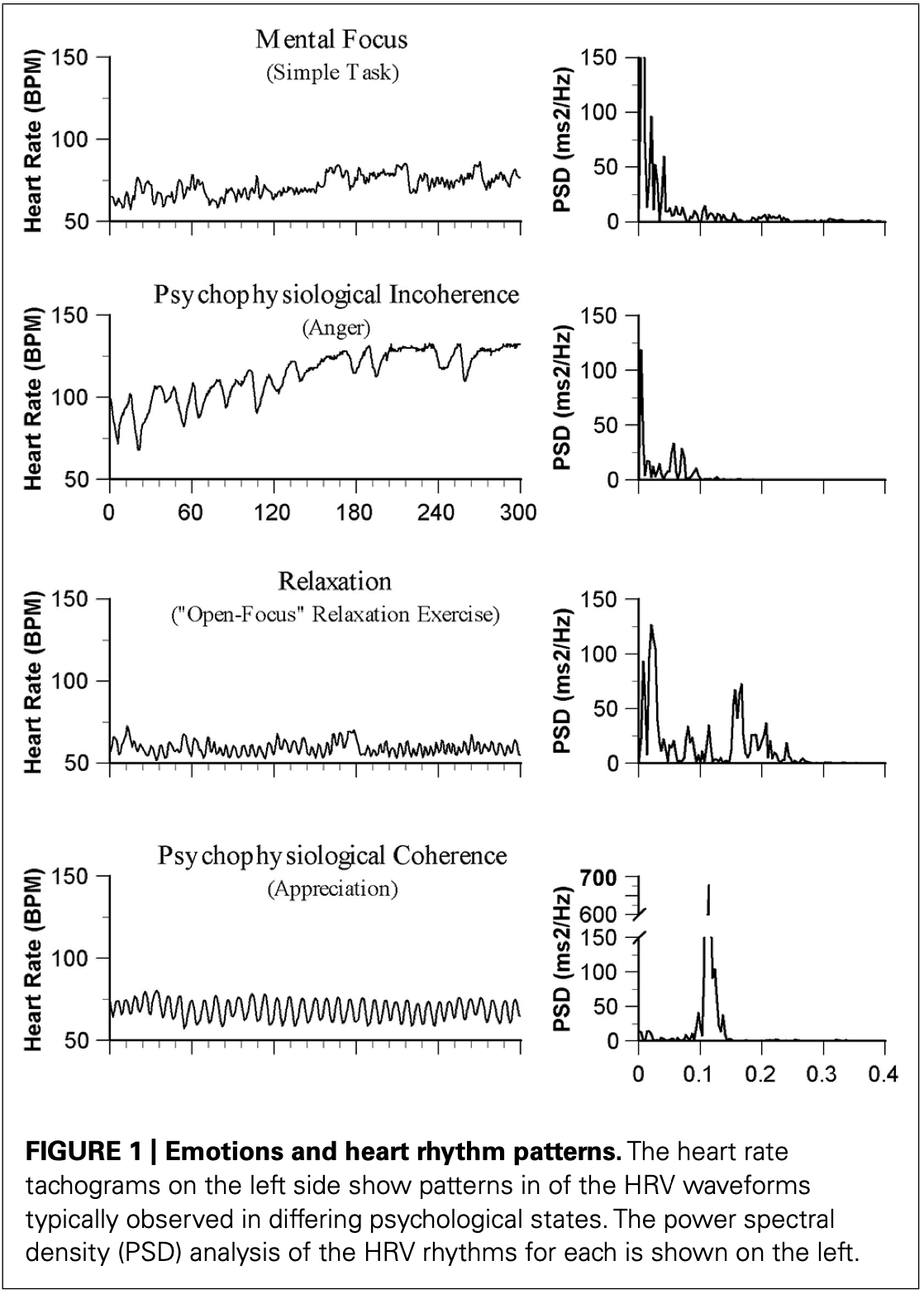What is Heartmath®
What is Heartmath?
Although we generally think of our heart rate as a steady drumbeat, A healthy heart rhythm is actually complex and constantly changing. These changes respond to changes in our physical and psychological state. Our heart works with the central nervous system and hormonal system to respond to perceived challenges and maintain a state of balance. There is a strong connection between the heart and the brain. A heart that has good heart rate variability (i.e., one that knows how to adapt its rhythm to the body's needs) and that beats regularly sends a signal to the brain that everything is fine and that there is no need to stress. Heart coherence is an optimal state in which the heart, mind and emotions are aligned and synchronized. Physiologically, the immune, hormonal and nervous systems function in a coordinated and harmonious manner.
We then feel calm, soothed, and full of energy, we have a clear mind, our physical and mental performance is optimal, we become emotionally intelligent, when we are faced with a difficult situation, we do not let ourselves be carried away by our emotions.
The techniques developed by the HeartMath® Institute allow you to enter into heart coherence and improve it considerably.
Heart coherence brings together practical techniques developed to help you improve your quality of life. You learn to immediately transform negative emotions through breathing exercises and conscious concentration on your heart. Cardiac coherence should be seen as a sports training of the heart to be integrated into your lifestyle over the long term.
HeartMath® technology is an innovative approach to improving emotional well-being by improving your heart rate variability. By altering your heart's rhythm to create a physiological coherence, a scientifically measurable state characterized by increased order and harmony in our mind, emotions, and body. The goal of HeartMath biofeedback is to teach you how to bring your brain, mind, body, and emotions into balanced alignment.
This state of equilibrium is called coherence.
Heart Rate Variability: HRV
Our heart rate is constantly changing, i.e. the time intervals between heartbeats are constantly changing. This is called heart rate variability (HRV). HRV gives us important information about our resilience and vitality, but also about the current state of our body. HRV analysis shows that the heart is sensitive to emotional changes. The degree of cohesion of HRV is called cardiac coherence.
Scientists and physicians consider HRV to be an important indicator of health and fitness. As a marker of physiological resilience and behavioral flexibility, it reflects our ability to adapt effectively to stress and environmental demands.
A high HRV is an important marker for health and well-being. In summary:
- HRV is a measure of the ability of the autonomic nervous system and the heart to adjust the heart rate together
- VFC is a marker of resilience and vitality
- HRV is a predictor of disease and death risk
- HRV decreases with age
- HRV is influenced by caffeine, tobacco and medications
- We can maintain optimal HRV by living healthy, exercising, and managing stress well.
Where does it come from?
Dr. Childre, founder of HeartMath®, is a global authority on stress reduction, resilience building, and personal effectiveness. He is the creator of the HeartMath® System, which includes practical, heart-based tools and technologies that people of all ages and backgrounds can use to improve their health, performance, and well-being.
In 1991, Childre founded the HeartMath Institute, a nonprofit research and education organization. research HeartMath Institute's organizational, educational, and clinical research on emotional physiology and self-regulation has been published in peer-reviewed scientific journals and presented at numerous scientific conferences worldwide. HeartMath® tools and techniques are based on more than 25 years of research scientific research conducted at the HeartMath Institute on the psychophysiology of stress, emotions and interactions between the heart and the brain. More than 300 independent studies or peer-reviewed studies using HeartMath® techniques or technologies to achieve beneficial outcomes have been published.
For whom?
For all
Several thousand people around the world already use the intelligence of their heart to consciously regulate their emotional experience.
Hospitals Use Cardiac Coherence to Calm Patients
Police use HeartMath cardiac coherence to de-stress their officers (Finnish special units, Las Vegas police, Milwaukee police, Florida police, etc.)
Many athletes around the world use it daily
Many schools are adopting the HeartMath® method
French fighter pilots etc...
Does your doctor want you to find new ways to manage stress?
Is your blood pressure high, despite medication?
Do you feel overwhelmed at work or at home?
Is your stomach often upset?
Are you an athlete looking to improve your performance?
Does your partner want you to learn how to control your anger?
If you answered yes to any of these questions and are looking for new and improved ways to control stress and related medical issues, HeartMath is for you.
Cardiac coherence is recommended by the French Federation of Cardiology


For what?
To take charge of your body, mind, emotions and life! This technology offers an innovative approach to improving emotional well-being. During these sessions, you will learn to change the rhythm of your heart to create physiological coherence, a scientifically measured state characterized by increased order and harmony in your mind, emotions and body.
Regular use of HeartMath® techniques allows you to better control your physiological response to stress and anxiety, increasing your resilience and ability to regulate your emotions. The technique is most effective when combined with coaching or training from a certified HeartMath practitioner or possibly integrated into ongoing psychotherapy.
HeartMath® is an evidence-based intervention for anxiety, stress, depression and more, with benefits demonstrated through 25 years of research.
The emWave system is suitable for clients with conditions where it is appropriate to reduce stress and of restore the balance of the Autonomic Nervous System .
Applications where the emWave cardiofeedback system has been successfully used to reduce stress-related discomfort, as a complementary approach, include*:

*The heart rate tachograms on the left side show patterns of HRV waveforms typically observed in different psychological states. Power spectral density (PSD) analysis of HRV rhythms for each of them is shown on the left.
Source: FRONTIERS in PSYCHOLOGY September 29, 2014-Cardiac coherence, self-regulation, autonomic stability, and psychosocial well-being
Rollin McCraty1* and Maria A. Zayas2
Acute, chronic and recurring pain
- Headaches - tension and migraine type
- Abdominal pain
- Burns
- Acute pain related to procedures
Psychophysiological problems
- Insomnia
- Stress management
- Cardiovascular rehabilitation
- Irritable bowel syndrome
- Somatization/Somataform/Conversion Disorders
- Habit disorders
- Tics/Tourettes
Emotional/behavioral problems
- Anxiety disorders
- Depression
- Anger Management
- Emotional Dysregulation
- Asperger's syndrome
Learning and performance problems
- Performance anxiety
- Peak Performance Training
- ADHD
Chronic diseases
- Asthma
- Chronic pain
- Fibromyalgia
- Cancer
- Atopic dermatitis
- Type I and Type II Diabetes
- High blood pressure
- Reflex sympathetic dystrophy
- Sickle cell anemia
- Immune system dysfunction
- Inflammatory bowel disease
- Muscle spasticity
*HeartMath® has developed highly effective programs for self-improvement of mental, emotional and physical balance. HeartMath® technology and materials are not intended to replace medical or psychological treatment provided by physicians, psychologists or other licensed health professionals. HeartMath® tools and techniques are not intended to replace therapy or medical treatment for emotional or mental health issues. If you are currently undergoing any form of treatment or taking medications to improve your physical or mental health and well-being, please seek and follow the advice of the professionals who support you before making any changes.




